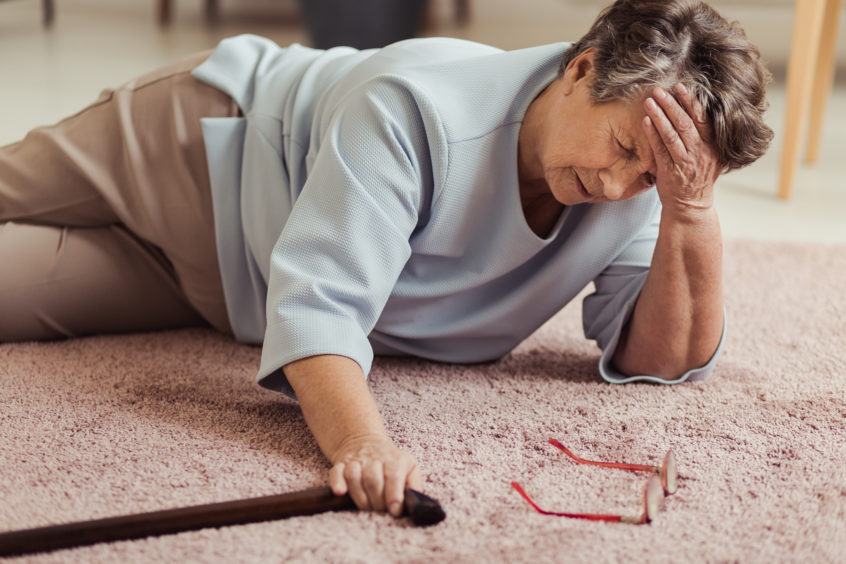According to the Centers for Disease Control (CDC), in 2019, 34,000 people over age 65 died as a result of falls, and another 3 million ended up in the emergency room. In fact, more than one out of four older adults fall each year, but less than half tell their doctor, and falling once doubles your chances of falling again.
- One out of five falls causes a serious injury such as broken bones or a head injury.
- Over 800,000 patients a year are hospitalized because of a fall injury, most often because of a head injury or hip fracture.
- More than 95% of hip fractures are caused by falling, usually by falling sideways.
- Falls are the most common cause of traumatic brain injuries (TBI).
Though some falls aren’t serious, they can make the person afraid of another fall, causing the individual to limit their everyday activities. This contributes to a cycle where being less active causes the person to become weaker, and ultimately more prone to falling.
What Can Contribute to Falling?
Many risk factors may contribute to falling, but some of these can be changed or modified. Risk factors include:
- Lower body weakness.
- Vitamin D deficiency (that is, not enough vitamin D in your system).
- Difficulties with walking and balance that may be caused by vestibular disorders, such as benign proximal positional vertigo (BPPV).
- Use of medicines, such as tranquilizers, sedatives, or antidepressants. Even some over-the-counter medicines can affect balance and how steady you are on your feet.
- Vision problems.
- Foot pain or poor footwear.
- Home hazards or dangers such as broken or uneven steps, and throw rugs or clutter that can be tripped over.
Most falls are caused by a combination of these risk factors. The more risk factors a person has, the greater their chances of falling.
To determine why you may be falling or how to prevent falls, talk with your primary care provider. If you are experiencing dizziness or balance issues, it may be appropriate for you to have your inner ear, which is an important factor in your ability to balance, evaluated by an audiologist who specializes in dizziness and balance disorders.
You also may want to see if you are taking any medicines that might cause problems with balance or dizziness.
Your doctor also might refer you for physical therapy to help you strengthen your body and balance.
And, you might want to consider having your vision checked regularly. Poor vision or wearing bifocal or progressive lenses can make objects, such as steps, seem closer or farther away than they really are.
In addition, you can take some simple steps to be sure your home is safe:
- Walk around your house keeping an eye out for things you might trip over, such as door mats or throw rugs, or piles of magazines or newspapers. Get rid of any objects that might be a hazard or move them to a safe location.
- Use motion-sensitive or regular night lights, or turn the lights on when walking at night in the home to prevent falling in complete darkness.
- Add grab bars inside and outside the tub or shower and next to the toilet.
- Put railings on both sides of any stairs.
- Make sure your home is well lit. Add more lights or brighter bulbs, if necessary, and add motion-detector night lights to hallways and bathrooms to help light your path.
- Keep items you use often in cabinets within reach. Avoid using a step stool or ladder.
- Use non-slip mats in the bathtub and on shower floors.
- Wear flat shoes that are easy to walk in, such as a walking or tennis shoe. Avoid shoes or boots with higher heels.
- If you need a cane or walker to safely move about your home, use it.
- Be sure snow and ice are cleared before using steps and sidewalks. If you can’t safely clear them yourself, ask a friend, neighbor or family member to clear them, or hire someone to take care of them.
Danielle Dorner, Au.D., is a specialist in vestibular disorders with Associated Audiologists. For those experiencing dizziness and balance problems, she uses sophisticated testing to determine a possible diagnosis and treatment, or if a referral to a medical specialist is necessary.
Schedule an appointment with Dr. Dorner.
The National Council on Aging also provides a free online screening tool to help you determine your risk for falling. Learn more here.



